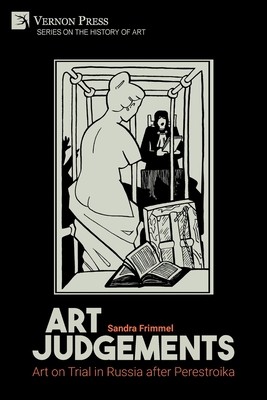
- We will send in 10–14 business days.
- Author: Sandra Frimmel
- Publisher: Vernon Press
- ISBN-10: 1648894461
- ISBN-13: 9781648894466
- Format: 15.2 x 22.9 x 1.7 cm, minkšti viršeliai
- Language: English
- SAVE -10% with code: EXTRA
Reviews
Description
An unusually large number of court cases against art, artists, and curators have taken place in Russia since the turn of the century. In reference to two of the most prominent, against the organizers of the exhibitions 'Caution, Religion!' and 'Forbidden Art 2006', the author examines the ways in which the meaning of art and its socio-political effects are argued in court: How do these trials attempt to establish a normative concept of art, and furthermore a binding juridical understanding of art? How is the discussion of what is permissible in art being framed in Russia today?
Research into the post-Soviet art trials has been mainly journal-driven until today. Only the fairly recent trials of the Pussy Riot activists and Pyotr Pavlensky provoked lengthy publications, but these are mostly concerned with explicitly political and activist art rather than its particular discourse when on trial. This book, however, takes a scholarly approach towards (Russian) art on trial. It puts the cases in a national-historical context, which is compared from international perspectives, and particularly focuses on the way in which these proceedings have intensified juridical power over artistic freedom (of speech) in the production of art in Russia.
This book will appeal to academics and students in the areas of art history, cultural science, sociology, and Slavic studies, as well as jurists, curators and museum specialists, researchers and employees in cultural institutions.
EXTRA 10 % discount with code: EXTRA
The promotion ends in 21d.14:26:04
The discount code is valid when purchasing from 10 €. Discounts do not stack.
- Author: Sandra Frimmel
- Publisher: Vernon Press
- ISBN-10: 1648894461
- ISBN-13: 9781648894466
- Format: 15.2 x 22.9 x 1.7 cm, minkšti viršeliai
- Language: English English
An unusually large number of court cases against art, artists, and curators have taken place in Russia since the turn of the century. In reference to two of the most prominent, against the organizers of the exhibitions 'Caution, Religion!' and 'Forbidden Art 2006', the author examines the ways in which the meaning of art and its socio-political effects are argued in court: How do these trials attempt to establish a normative concept of art, and furthermore a binding juridical understanding of art? How is the discussion of what is permissible in art being framed in Russia today?
Research into the post-Soviet art trials has been mainly journal-driven until today. Only the fairly recent trials of the Pussy Riot activists and Pyotr Pavlensky provoked lengthy publications, but these are mostly concerned with explicitly political and activist art rather than its particular discourse when on trial. This book, however, takes a scholarly approach towards (Russian) art on trial. It puts the cases in a national-historical context, which is compared from international perspectives, and particularly focuses on the way in which these proceedings have intensified juridical power over artistic freedom (of speech) in the production of art in Russia.
This book will appeal to academics and students in the areas of art history, cultural science, sociology, and Slavic studies, as well as jurists, curators and museum specialists, researchers and employees in cultural institutions.


Reviews